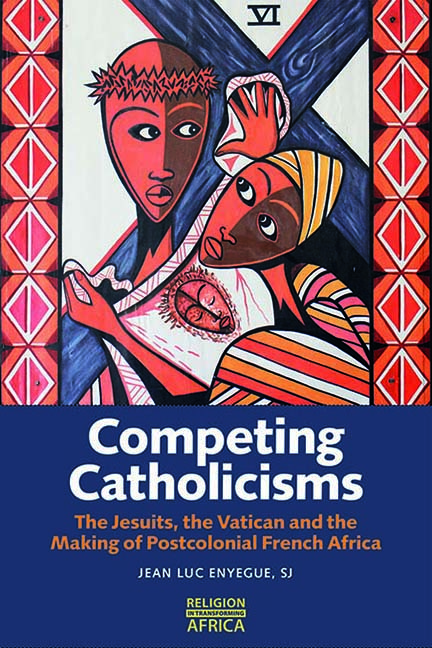Book contents
- Frontmatter
- Dedication
- Contents
- List of Illustrations
- Acknowledgements
- List of Abbreviations
- Glossary
- Chronology of Jesuit Missions in Chad and Cameroon
- Introduction: The End of the Jesuit Mission in Africa?
- Part I The Jesuit Project in West Africa: French Catholicism and Colonialism in Chad, 1935–58
- Part II The Outward Mission: Education and Competing Catholicisms
- Part III The Postcolonial Mission and Catholicity: From Chad to Cameroon, 1962–78
- Conclusion
- Bibliography
- Index
- Previously published titles in the series
- Frontmatter
- Dedication
- Contents
- List of Illustrations
- Acknowledgements
- List of Abbreviations
- Glossary
- Chronology of Jesuit Missions in Chad and Cameroon
- Introduction: The End of the Jesuit Mission in Africa?
- Part I The Jesuit Project in West Africa: French Catholicism and Colonialism in Chad, 1935–58
- Part II The Outward Mission: Education and Competing Catholicisms
- Part III The Postcolonial Mission and Catholicity: From Chad to Cameroon, 1962–78
- Conclusion
- Bibliography
- Index
- Previously published titles in the series
Summary
This Part focuses on the early years of the mission (1935–46), when its actual nature was in a period of confusion. The mission was initiated by a single individual, Frédéric de Bélinay (1875–1958), without a mandate from his Jesuit superiors. It was formally approved without it being clear whether it was intended to evangelise or civilise. The inclination of the pioneers of the mission, this chapter argues, was towards Frenchification. This was the process by which missionaries helped to negotiate the remaking of French identity and moral prestige in the context of the end of the French empire and a decreasing Catholicism at home. This new missionary outreach increased the self-worth of the missionaries. It also gave them global purpose as they embarked on a conquering movement aimed at keeping African colonies under French political and cultural influence. The Jesuit mission in Chad, the chapter argues, shared the civilising nature of all Catholic missions in the 1930s. The missionaries, however, adapted this civilising mission to the unique context of France and Chad after the Second World War. This context was shaped by French strategic interests in Africa and the Middle East, and the urgent need to contain secularising trends in Chad that were already ‘infiltrating’ French towns and cities. The Jesuit missionaries in Chad were part of a broader project which the French government claimed worked towards ‘pacification’ of the region and maintaining the colonial established order.
In the 1930s, Chad became the battleground for global ideologies, religions, and politics. A Muslim-majority country for centuries, Chad witnessed a new move southwards of Islam. This resurgence of Chad's Islam coincided with the beginning of renewed efforts to Christianise the southern part of the country. It began with the arrival of the first Protestant missions in 1920, closely followed by Catholic missionaries in 1929.
Prior to the 1920s, the Capuchins, from the eighteenth century, and the Holy Ghost Fathers, from the nineteenth, had missioned to Central Africa. With the early French colonial expeditions known as ‘Mission Marchand’, ‘Mission Maistre’, and ‘Mission Foureau-Lamy’, Chad had become part of the Catholic Apostolic Vicariate of Ubangi. The Sudan United Mission launched its mission in the same region in 1904.
- Type
- Chapter
- Information
- Competing CatholicismsThe Jesuits, the Vatican and the Making of Postcolonial French Africa, pp. 25 - 29Publisher: Boydell & BrewerPrint publication year: 2022



